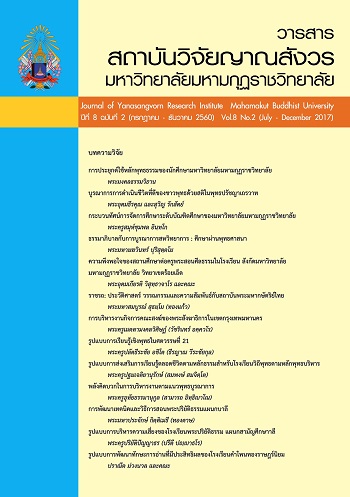The Buddhadhamma Application of Mahamakut Buddhist University Students
Main Article Content
Abstract
This research study has purposes; (1) to study the Individual factor, Iddhipada 4 factor, Gharavasa-dhamma 4 factor, and Brahma-vihara factor of students at Mahamakut Buddhist University. (2) the research study aims at examining the factors relating to the application of Buddhist moral principles of students at Mahamakut Buddhist University. Stratified Random Sampling was employed in sampling population. Population of the current study was 101 students at Mahamakut Buddhist University. Questionairs were used as a research instrument. Statistics used for data analysis were Percentage (%), Mean ( ), Standard Deviation (S.D.) and Chi-square. The findings revealed as follows : 1. Senior students at Mahamakut Buddhist University who attended the Vipassana Meditation practical section program were able to apply the Buddhist moral principles to the program at moderate level (
= 3.44). Additionally, when analyzing the data based on each aspect, the results presented that Iddhipada 4 aspect was rated at moderate level (
= 3.27), Gharavasa-dhamma 4 aspect was rated at high level (
= 3.61), Brahma-vihara aspect was rated at high level (
= 3.75), and the dharma practice aspect was rated at moderate level (
= 3.34). 2. Senior students at Mahamakut Buddhist University who attended the Vipassana Meditation practical section program, whose varied in a status, would not have a relationship with the application of Buddhist moral principles. 3. Senior students at Mahamakut Buddhist University who attended the Vipassana Meditation practical section program, whose varied in age, would not have a relationship with the application of Buddhist moral principles. 5. Senior students at Mahamakut Buddhist University who attended the Vipassana Meditation practical section program, whose varied in the faculty studied in, have a relationship with the application of Buddhist moral principles.
Article Details
References
พูนสุข ภูสุข. (2555). “ประสิทธิภาพการปฏิบัติงานตามหลักอิทธิบาท 4 ของข้าราชการฝ่ายอัยการสำนักงานอัยการคดีเยาวชนและครอบครัวจังหวัดในภาคตะวันออกเฉียงเหนือ”. วิทยานิพนธ์ปริญญาพุทธศาสตรมหาบัณฑิต. บัณฑิตวิทยาลัย : มหาวิทยาลัยมหาจุฬาลงกรณราชวิทยาลัย.
นิพนธ์ โอภาษี. (2557). “การบริหารงานตามหลักอิทธิบาท 4 ขององค์การบริหารส่วนตำบลห้วยถั่ว เหนือ อำเภอหนองบัว จังหวัดนครสวรรค์”. วิทยานิพนธ์หลักสูตรปริญญาพุทธศาสตรมหาบัณฑิต. บัณฑิตวิทยาลัย : มหาวิทยาลัยมหาจุฬาลงกรณราชวิทยาลัย.
พัชรี ชำนาญศิลป์. (2554). “ประสิทธิภาพการบริหารจัดการวิทยาลัยการอาชีพนครสวรรค์ตามหลักอิทธิบาท 4”. วิทยานิพนธ์พุทธศาสตรมหาบัณฑิต. บัณฑิตวิทยาลัย : มหาวิทยาลัยมหาจุฬาลงกรณราชวิทยาลัย.
วิชญาภา เมธีวรฉัตร. (2554). “การพัฒนาทรัพยากรมนุษย์ตามหลักอิทธิบาท 4 : กรณีศึกษาโรงเรียนคีรีวงศ์วิทยาจังหวัดนครสวรรค์”. ปริญญานิพนธ์พุทธศาสตรมหาบัณฑิต. บัณฑิตวิทยาลัย : มหาวิทยาลัยมหาจุฬาลงกรณวิทยาลัย.
นภัสวรรณ ปรางค์พันธุ์. (2552). “การพัฒนาคุณธรรมผู้นาเยาวชนตามหลักฆราวาสธรรม4 :กรณีศึกษาโรงเรียนสามพรานวิทยาอำเภอสามพรานจังหวัดนครปฐม”. วิทยานิพนธ์พุทธศาสตรมหาบัณฑิต. บัณฑิตวิทยาลั : มหาจุฬาลงกรณราชวิทยาลัย.
นิธินันท์ นาคบุรี. (2552). ทัศนะของนิสิตมหาวิทยาลัยมหาจุฬาลงกรณราชวิทยาลัยที่มีต่อการบริหารงานของสานักงานตำรวจแห่งชาติตามหลักฆราวาสธรรม4. วิทยานิพนธ์มหาบัณฑิต. มหาจุฬาลงกรณราชวิทยาลัย.
พระสมทบ ถิรปญฺโญ. (2554). ภาวะผู้นำของเยาวชนตามหลักฆราวาสธรรม4 :กรณีศึกษาโรงเรียนหล่มสักวิทยาคมจังหวัดเพชรบูรณ์. วิทยานิพนธ์พุทธศาสตรมหาบัณฑิต. บัณฑิตวิทยาลัย. มหาวิทยาลัยมหาจุฬาลงกรณราชวิทยาลัย.
วิเชียร ด้วงพริ้ม. (2555). “ความพึงพอใจของประชาชนที่มีต่อการบริหารงานตามหลักพรหมวิหาร4ของผู้นำท้องถิ่น : ศึกษาเฉพาะกรณีเทศบาลหัวไทรอำเภอหัวไทรจังหวัดพระนครศรีธรรมราช”. สารนิพนธ์ศาสนศาสตรมหาบัณฑิต. บัณฑิตวิทยาลัย : มหาวิทยาลัยมหามกุฎราชวิทยาลัย.
วิเชียร บุญกล้า. (2556). “การศึกษาการใช้หลักพรหมวิหาร4ของผู้บริหารสถานศึกษาในสถานศึกษาขั้นพื้นฐานสังกัดสานักงานเขตพื้นที่การศึกษาสุรินทร์เขต 3”. วิทยานิพนธ์ครุศาสตรมหาบัณฑิต. บัณฑิตวิทยาลัย : มหาวิทยาลัยราชภัฏสุรินทร์.
ณัฐวรรณ ฐิตาคม. (2556). “การประยุกต์ใช้พรหมวิหาร4ในการบริหารงานของผู้บริหารสถานศึกษาสำนักงานเขตพื้นที่การศึกษามัธยมศึกษาเขต 42”. วิทยานิพนธ์ปริญญาพุทธศาสตรมหาบัณฑิต. บัณฑิตวิทยาลัย : มหาวิทยาลัยมหาจุฬาลงกรณราชวิทยาลัย.


